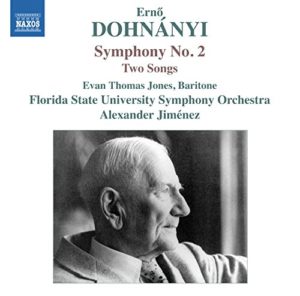Given its 1944/45 date, the Second Symphony that Ernő Dohnányi—a.k.a. Ernst von Dohnányi—wrote, is an arch-conservative, anachronistic, post-Brahmsian work: A behemoth of grand romantic gesture in four movements. Brass, wind, and timpani push the symphony into hard-edged action with the opening subject of a very properly constructed sonata-form first movement. It’s all a bit mighty and on the nose but it also has that late-romantic appeal that you know you either love or don’t, depending on how you react to Pfitzner or Zemlinsky (whose work is more chromatic) or Joseph Marx or the like.
You’d never think the inner movements were composed in Budapest and Vienna at the height of a losing war: The second is pleasantly pastoral and the third (titled “Mockery”) is a brief, wild quasi-Scherzo that has the qualities of a circus romp in the run-up to the finale. The war-elegy, if you were waiting for it, finally comes in the fourth movement, with an orchestrated, adapted Bach chorale, fittingly “Komm, süßer Tod” (“Come, Sweet Death”) from the Schemelli Songbook. Dohnányi then duly turns this into a fugue before coaxing a rousing happy end from the material, after all. Even in this revised version, cut down a bit from the hour-long original, the work has a tendency to sprawl. You get the sense it’s more attractive than good; but attractive it is, and not without originality.
Although they are the more derivative of the works on this disc, the two orchestrated songs for baritone, “Gott” and “Sonnesehnsucht”, provide for the more memorable moments. These works—on disc for the first time!—sound, quite happily, as if Dohnányi had taken a crack at re-composing Wotan’s Farewell, and done pretty well at it. Baritone Evan Thomas Jones doesn’t strike to be a particularly interesting voice (yet), but certainly is a very fine one—and the German text comes across passably well. For the very low notes (really in bass territory), he has to stretch a little.
Here, as in the Symphony, the Florida State University Symphony Orchestra under Alexander Jiménez does well enough to make this an enjoyable release. (FSU was where Dohnányi taught in his last decade.) It doesn’t sound like a world-class ensemble, not surprisingly, but it certainly never sounds—even in the modest acoustic in which the orchestra was caught at Ruby Diamond Concert Hall in 2013—as though it is actively undermining the music. If you are looking just for the symphony, though, in the (full-price) Chandos recording of Matthias Bamert and the BBC Philharmonic, you get a richer, more secure-sounding, more animated interpretation.
































